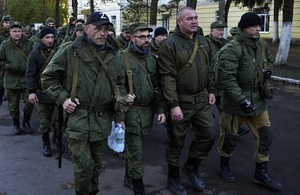UK sanctions Russian officials behind conscription, mobilisation and criminal mercenaries
Foreign Secretary James Cleverly announced 22 new sanctions targeting officials who have promoted and enforced mobilisation to fight in Russia's war on Ukraine.

- Deputy Prime Minister of Russian Federation and officials behind the forced mobilisation of citizens in Russia sanctioned
- Arkady Gostev, Director of the Federal Penitentiary Service of the Russian Federation, also sanctioned for supporting the recruitment of prisoners into Wagner Group
- the UK has now sanctioned over 1,200 individuals and over 120 entities in response to Putin’s war in Ukraine
The Foreign Secretary has today (Wednesday 30 November) announced a new package of 22 sanctions targeting the officials who have promoted and enforced the conscription of citizens to fight in Russia’s illegal war in Ukraine.
This includes the Deputy Prime Minister Denis Valentinovich Manturov, who is responsible for overseeing the Russian weapons industry and responsible for equipping mobilised troops.
Ten governors and regional heads have also been sanctioned. This includes the heads of Dagestan, Ingushetia and Kalmykia – some of Russia’s poorest ethnic republics, from which a significant number of conscripts have been drawn. In July, the UK sanctioned 29 regional governors for their role in providing financial support to Russian proxy administrations in Ukraine.
Foreign Secretary James Cleverly said:
The Russian regime’s decision to partially mobilise Russian citizens was a desperate attempt to overwhelm the valiant Ukrainians defending their territory. It has failed.
Today we have sanctioned individuals who have enforced this conscription, sending thousands of Russian citizens to fight in Putin’s illegal and abhorrent war.
The UK will continue to use both sanctions and military aid to support Ukraine in the defence of their independence.
Arkady Gostev, Director of the Federal Penitentiary Service of the Russian Federation and Dmitry Bezrukikh, the head of the Federal Punishment Service of the Rostov region, have also been sanctioned.
Bezrukikh and Gostev have reportedly worked closely with oligarch Yevgeny Prigozhin, ally of Putin and head of the Wagner Group, to fill the ranks of the mercenary gang that is supporting Russia’s army in Ukraine.
They have drafted criminals, including murderers and sex offenders, in exchange for pardons from President Putin – resulting in Bezrukikh’s region being dubbed ‘The Wagner Group recruitment hub’.
Also sanctioned today are Ella Pamfilova, chairperson of the Central Election Commission and Andrey Burov, head of the regional election commission in Rostov, who were both responsible for organising the sham referendums in the four temporarily occupied areas of Ukraine. Pamfilova has since actively supported Russia’s forced mobilisation.
The UK has continued to support Ukraine through delivering vital military equipment, as well as implementing targeted sanctions to undermine the Russian war machine.
The UK has committed over £2.3 billion in military aid to Ukraine, including most recently a package including 25 anti-aircraft guns and technology to counter deadly Iranian-supplied drones.
UK sanctions are also having a significant impact on Russia’s ability to maintain their war machine. Technology imports have forced them to mobilise Soviet-era tanks and use semiconductors from kitchen appliances to restock equipment. Recent Defence Intelligence has shown that Russia is likely removing nuclear warheads from ageing cruise missiles, and using them in Ukraine, as a desperate attempt to maintain their assault.
View the full UK Sanctions List.
Background
Asset freeze
An asset freeze prevents any UK citizen, or any business in the UK, from dealing with any funds or economic resources which are owned, held or controlled by the designated person. UK financial sanctions apply to all persons within the territory and territorial sea of the UK and to all UK persons, wherever they are in the world. It also prevents funds or economic resources being provided to or for the benefit of the designated person.
Travel ban
A travel ban means that the designated person must be refused leave to enter or to remain in the United Kingdom, providing the individual is an excluded person under section 8B of the Immigration Act 1971.
Transport sanctions
Recently introduced powers make it a criminal offence for any Russian aircraft to fly or land in the UK and give the government powers to remove aircraft belonging to designated Russian individuals and entities from the UK aircraft register, even if the sanctioned individual is not on board. Russian ships are also banned from UK ports.
Media enquiries
Email newsdesk@fcdo.gov.uk
Telephone 020 7008 3100
Email the FCDO Newsdesk (monitored 24 hours a day) in the first instance, and we will respond as soon as possible.